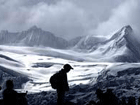| Videos | • Latest |
|
• Feature | • Sports | • Your Videos |
Climate change threatens Tibetan plateau
The Qinghai-Tibetan Plateau is Earth's third largest store of ice after the South and North poles. But that store is rapidly melting amid the onset of climate change. It will affect the water supply for up to a billion people and the atmospheric circulation for more than half the planet. Xie Zheng, meets the people living on the plateau and enduring its changes.
Life as a herdsman at more than 45-hundred meters above sea level does not carry lofty expectations. You don't have to always count the number of sheep in the herd, and it almost certainly grows year-by-year.
There is always more grass than the livestock could consume, and there is minimal risk of infectious diseases at this altitude.
But all that is changing.
Continuous expansion of water is rapidly shrinking the land for livestock. The Serling Tso Lake was joined by another lake to form what is -- at 16-hundred square kilometers -- the second largest body of water in Tibet.
Buga, village head of Nagqu Prefecture, Tibet, said, "My family has been living by the lake since my grandfather. The lake has always been expanding, but not as dramatically as since the late 1980s. In 2001, the local government set up a two-meter high pole to measure the increase of the water level. Now, even the pole itself is underwater. If you ride a motorcycle for 18 kilometers in width and 50 kilometers in length, that will be the grassland consumed by the expanding water."
A bird's eye-view of the lake from the highest nearby hill shows that a tiny spot in the water is all that remains of a village headquarters just a few years ago.
The heat is on.
Older generations attribute it to the anger of the water gods. But many Tibetans believe it has been caused by melting glaciers atop of the mountains.
The plateau is experiencing a rise in temperature of up to 0.3 degrees Celsius - approximately three times the global warming rate. If the current trend continues, two-thirds of the plateau glaciers could be gone by 2050. In the short-term, this could trigger floods on the plateau. In the long-term, the water supply for billions of people is at stake.
Gyaltsen Wangdrak, deputy commissioner of Nagqu Prefecture, Tibet, said, "Preserving the environment plays an important part in Tibetan culture. We observe big lakes and high mountains as divine symbols. People won't touch a single blade of grass near them. We have never had any industry on our land. So why is our homeland so vulnerable to climate change? Why is the temperature continuing to rise even if we have such an environmentally friendly culture?"
Dr. Kang Shichang is a renowned researcher on the Tibetan Plateau. For decades, he has gathered data on the plateau's climate history. Scientists have drilled ice cores, up to hundreds of meters long, from glaciers above 7-thousand meters high. Dr. Kang has a theory as to why the mountain glaciers are melting.
Dr. Kang Shichang said, "The components in the ice core tells us how the atmosphere was composed in different times of history. We found a dramatic accumulation of different pollutants and carbon since two centuries ago. Since Tibet itself does not have any industry in history, these pollutants certainly come from the industrial revolution of Western countries. This is also happening today since the atmospheric circulation can travel round the Earth as fast as in a week's time."
Rising temperatures have taken Tibet by the yak's horn. The Autonomous Region has recorded warmer winters for nine consecutive years. During summer, Tibetans have battled an unwelcome scourge of mosquitoes that had previously never been found at this altitude. Scientists have proposed different dates as to when the plateau's glaciers will melt over. All estimates are within a few decades. Efforts to save the world's third pole have been stepped up, but so far there has been no immediate solution.

 0 Comments
0 Comments







Comments